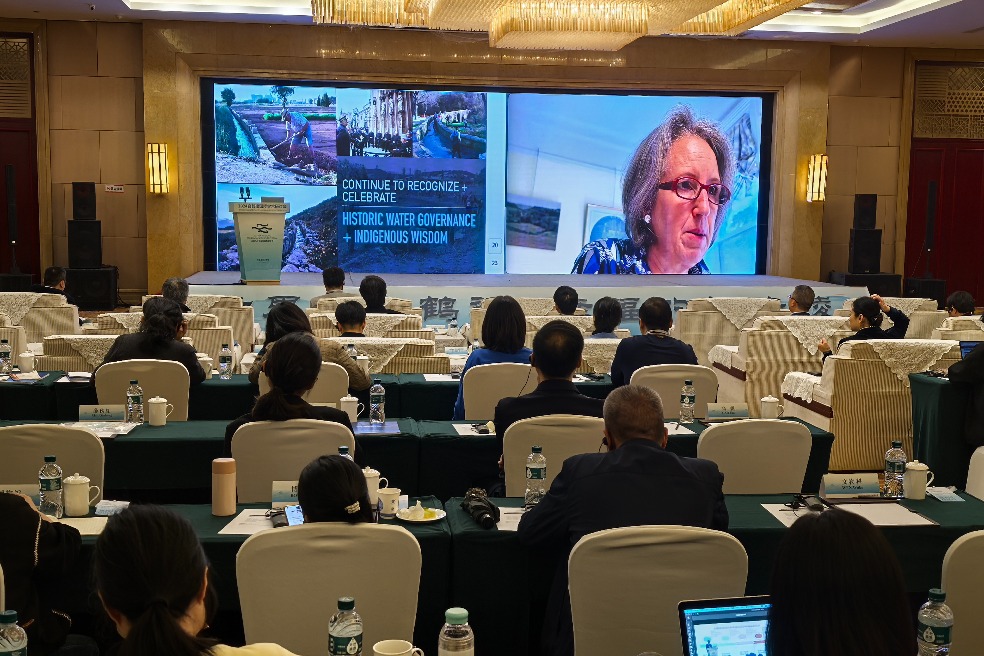Xibaipo: The launching pad for CPC's 'big exam'


Hebei village, the former headquarters of the Party and residence of its leaders including Chairman Mao, now a popular 'red tourism' site
A calendar lying open on a desk was turned to March 23, 1949. At Chairman Mao Zedong's former residence in Xibaipo village, Hebei province, the prop alludes to a watershed moment in the century-old history of the Communist Party of China.
That day, Mao and other revolutionaries packed up and left Xibaipo, a sacred place for the then 28-year-long Communist struggle, which paved the way for the founding of the People's Republic of China in 1949.
Their destination: Beijing, a war-ravaged city more than 350 kilometers away.
Zhao Di, a tour guide in Xibaipo, which is now a patriotic education base and a showcase of the country's booming revolution-themed "red tourism", said that he always emphasizes the date to visitors pouring in from across the nation all year round.
"It is the remembrance date for the Party's decision to go for a 'big exam in the capital city'," he told China News Service.
Zhao was referring to a metaphor coined by Mao 72 years ago.
At the time, the Kuomintang troops were retreating and the communists were leaving the village to build a new China in Beijing, which had long served as the Chinese capital during the imperial era.
Mao has drawn parallels between the central authorities' strategic change of residence and the arduous journeys taken by ancient scholars as they flocked to the capital city for the Imperial Examination.
Dating back to the Western Han Dynasty (206 BC-AD 24), the exam was aimed at selecting capable officials from civilians and was only abolished in the early 1900s, when the Qing Dynasty (1644-1911) was on the verge of collapse.
By shifting its base 72 years ago, the Party also shifted its role-from a revolutionary force to a ruling party tasked with rejuvenating the nation.
As the Party celebrates the centenary of its founding this year, the "exam metaphor" has gained traction nationwide.
It has been borrowed by Party officials as a reminder of its founding principles, and it has also been promoted to tens of millions of CPC members as the Party navigates the republic through modern challenges.
'Last rural command post'
Xibaipo, which literally means "a slope with cypresses", is tucked away in the rolling Taihang Mountains that separate Hebei from western neighbor Shanxi province.
Party historians dubbed it the CPC's "last rural command post" before establishing the PRC.
In March 1948, the central authorities settled down in the village as they worked to liberate larger parts of the country from the rule of the Kuomintang regime during the War of Liberation (1946-1949).
Xibaipo was chosen as a springboard as the CPC Central Committee moved out of Yan'an in the north of Shaanxi province and blazed a trail to Beijing, the capital city of a new republic.
Xibaipo was of strategic importance to the effort. Located at the junction of the Taihang Mountains and the North China Plain, it lies in a horseshoe-shaped basin surrounded on three sides by mountains and water on the remaining side.
The landscape proved to be advantageous from a military perspective, making it easy to hold but hard to attack.
Moreover, it abounds in wheat and rice-crucial for soldiers-and had a strong base of pro-communist farmers.
As the then headquarters of the People's Liberation Army, Xibaipo had served as the command center for several major, successful campaigns. Those victories led to the eventual defeat of the Kuomintang in 1949, forcing it to flee to Taiwan.
Xibaipo also hosted the Second Plenary Session of the Seventh CPC Central Committee, a landmark Party gathering that laid out the blueprint of the PRC, and the National Land Conference.
The decision to leave Xibaipo came as the Party was confronted with important questions as to what kind of country it wanted to establish and what kind of political party it wanted to become, said Kang Yanxi, a researcher with the Xibaipo Memorial Hall.
The "exam metaphor" was a product of the in-depth contemplation over the future of the revolution in the face of a "new situation", he told CNS.
Seventy-two years on, the CPC has proved itself to be an effective ruling party, presenting remarkable results on the "big exam".
Built from ruins and chaos left by the Kuomintang regime, the PRC has become the world's second-largest economy. It is also the world's biggest industrial country, largest goods trader and largest holder of foreign exchange reserves.
China also has the world's largest social security system, with basic medical insurance covering over 1.3 billion people and basic old-age insurance covering nearly 1 billion.
The average life expectancy of Chinese people has risen to 77.3 years, official figures show.
The country has also ended extreme domestic poverty, meeting the poverty reduction target set out in the United Nations' 2030 Agenda for Sustainable Development 10 years ahead of schedule.
The Party has united and led the Chinese people in making outstanding achievements, said Xu Lin, deputy head of the Publicity Department of the CPC Central Committee and minister of the State Council Information Office.
"China's development not only delivers a decent life to its people but also benefits the world," he said at a news conference in Beijing in March.
Patriotic education base
After years of development, Xibaipo has become a base for patriotic education and a popular red tourism destination. The former sites of the CPC Central Committee, a memorial hall and the National Security Education Hall are among its major attractions.
Batches of visitors come annually to study the spirit of jinjing gankao, or "going for a big exam in the capital city".
In March, apricot trees burst into full blossoms in the courtyard modeled after the one that once housed the CPC Central Committee.
In fact, Xibaipo today is a duplicate of the original village that sits a few kilometers away. The current site was set up in 1971 after a reservoir was built near the original more than a decade before.
Also duplicated were the former residences of former leaders including Chairman Mao, Zhu De, Liu Shaoqi, Zhou Enlai, Ren Bishi and Dong Biwu.
The headquarters of the Central Military Commission and an air-raid shelter were also recreated. Guides have described the military headquarters as a place with "one telephone, two maps, three sets of tables and chairs, and four bungalows", in a nod to the harsh wartime conditions.
Red tourism has been adopted by authorities in Pingshan county, where Xibaipo is located, to boost local incomes.
The county shook off its poverty label in October 2018, and now it continues to advance the nation's rural vitalization strategy alongside other locations in the less-developed countryside.
"Although the revolutionary base of Pingshan has shaken off poverty, we still face new tests," Dong Xiaohang, Party chief of the county, told Xinhua News Agency. He added that high-quality development would be the focus of Pingshan in the next five years.
Xin Ming, a professor at the Party School of the CPC Central Committee, said: "We need to combat new challenges. They include old and new types of corruption within the Party, the country's economic transition and problems related to the environment and resources."
Facing new tests, the CPC leadership has urged its members to be clear-headed and determined to prepare for tough tests in delivering performances that can withstand the test of time in the new era.
Qu Qingshan, head of the Institute of Party History and Literature of the CPC Central Committee, called for efforts to uphold Party leadership and Marxism, unwaveringly uphold and develop Socialism with Chinese characteristics and rely on the people.
- Beijing supercharging stations empower sustainable, green travel
- Mainland considering further measures on Taiwan trade restrictions: commerce ministry
- eVOTL aircraft developer conducts demo flight of new model
- Former senior political advisor sentenced for bribery
- Taiwan trade barriers investigated
- Sayram Lake explores clean energy to better ecological environment



































